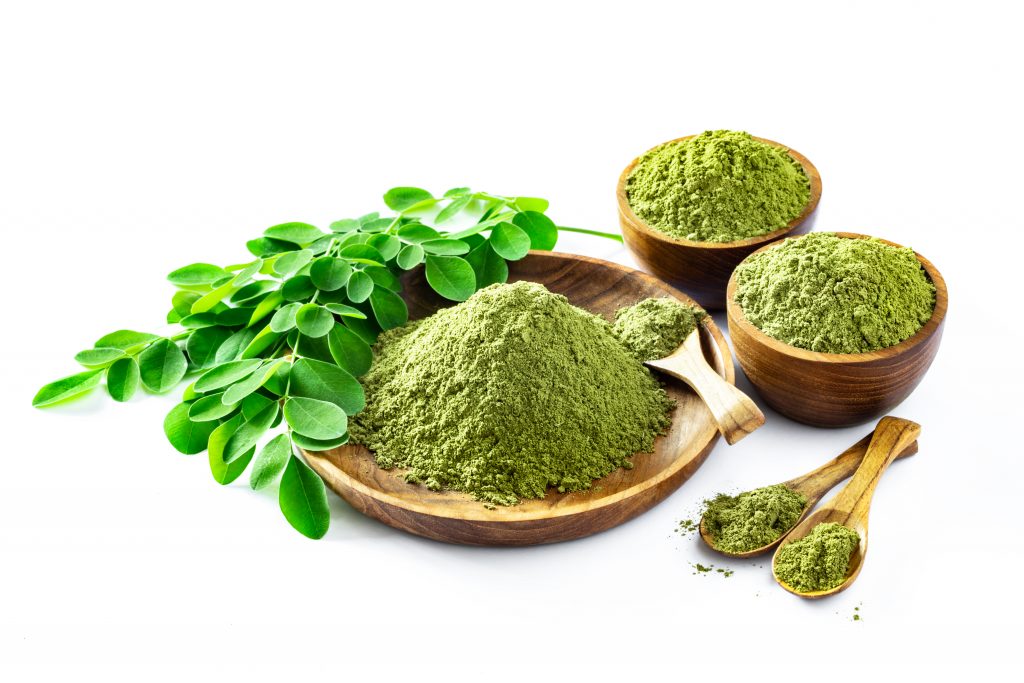If you've never heard of Moringa, you are not alone!
We all know greens are a powerhouse of vitamins, minerals and antioxidants. This is what gives many of them a ”superfood” status.
Kale, for instance, is all the rage and it's included in a ton of healthy recipes.
While kale certainly deserves its ”super food” status, it's not the only green leafy vegetable on the planet.
Remember, people in some parts of the world have never even heard of kale! So what is their ”kale” then?
EXCLUSIVE >> Do This EVERY Morning With Coconut Oil (unusual trick).
Let me introduce you to Moringa!!
Moringa grows in tropical regions of Africa and Southern Asia. It's known there for its medicinal and nutritional value.
All parts of moringa tree are consumed. (I'll share my own recipe for it in a minute.)
The moringa leaves and the long sticks holding the moringa pods are used for cooking. Moringa is a staple in Southern Indian cuisine.
Moringa boasts some outstanding health benefits.
- Nutient-dense food: Moringa leaves are low calorie food, yet scores high in nutrient density. Here are some of moringa's key nutrients
- Carotenoids: Alphacarotene, beta-carotene,
- Vitamin: Vitamin A, C, E , K, B complex vitamins include B1, B2, B3, B6, B7.
- Protein: Moringa contains all essential amino acids and is often referred to as a complete food.
- Minerals: Magnesium, iron, calcium, phosphorus, manganese
- Phytonutrients: Glucosinolates, glycosides, Isothiocyanates, and pterygospermin (anti-bacterial agent), the root bark provides the alkaloids moringine and spirochine.

Holistic medicine uses moringa leaves to prevent and treat certain health conditions.
Here are 5 Ways Moringa Protects Your Health
1. Protects your cells:
Leaves of moringa both mature and tender have potent antioxidant activity against free radicals. They help protect cells and organs from oxidative damage .
2. Liver protector:
Consuming the moringa leaves and shoots of moringa can help protect your liver from damage; a perfect add on to your detox menu.
Studies show that this effect is from the presence of total phenolic compounds, ?-sitosterol, quercetin and kaempferol, in the leaves.
3. Anti-inflammatory:
Moringa has a huge concentration of antioxidant compounds. It's often used in traditional medicine and alternative medicine as an anti-inflammatory agent.
A recent 2015 study showed that water extracts of moringa leaves can lower inflammatory causing agents.
4. Natural immune booster:
Moringa leaves are rich in protein, calcium and iron along with powerful phenolic antioxidants. These offer a fantastic boost to immune health.
Some studies also show that moringa leaves exhibit a strong anti-bacterial effect.
5. Healthy blood cholesterol:
Research conducted on animals and humans show that moringa is helpful to bring high cholesterol to healthy levels.
Buying & Storing Moringa
Moringa is available as frozen moringa leaves and dry moringa powder.
Frozen moringa leaves and moringa pods (also called Indian drumstick) can be found in Indian groceries.
Moringa leaves can be used in soups, smoothies and stir fries. Moringa powder can be used like spirulina powder in your favorite smoothie recipes.
Fresh moringa leaves can be stored in refrigerator for a week.
Remove the leaves from the stems and store it a dry container or ziploc bag. You can also freeze the leaves for long term storage.
Put your moringa to use today! Here's a delicious and easy recipe.
Moringa Leaves Dal Soup
- 1 Tsp. coconut oil
- 1 tsp. whole cumin seeds
- 2 tsp. red pepper flakes
- 1 medium onion, diced (1 ½ cups)
- 1 tsp. salt
- 1 cup yellow lentils, sorted and rinsed
- 2 cups low-sodium vegetable broth
- 1 tsp. ground turmeric
- 1 bunch of moringa leaves stems removed and leaves chopped
- 2 cups Water
How to make the soup
Heat oil in saucepan over medium-high heat. Stir in cumin and red pepper flakes, and sauté 1 minute.
Add onion, moringa leaves and salt, and sauté for a few more minutes until the leaves wilt.
Add lentils, vegetable broth, 2 cups water, and turmeric.
Cover, reduce heat to medium-low, and simmer 25 minutes, or until liquid is absorbed. The recipe can also be made in a slow cooker.
Remember to rotate your greens so you get a variety. This lets you reap the most benefits from these tasty plants.
Yours in Health,
Danette
P.S. Please share this info. with your friends and I always love reading your comments below.







